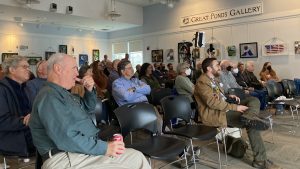Search results for: www%20cheap%20airline%20tickets%20com%20phone%20number%201-800-299-7264
Changes in the Metal Content of Surficial Sediments of Boston Harbor Since the Cessation of Sludge Discharge
Changes in the Metal Content of Surficial Sediments of Boston Harbor Since the Cessation of Sludge Discharge Zago, C., A.E. Giblin, and A. Bergamasco Elsevier, Marine Environmental Research, Vol. 51, pp. 389-415, 2001 WHOI-R-01-004
Read MoreDiseases, Pests, and Predators of Concern to New England Shellfish Growers
Diseases, Pests, and Predators of Concern to New England Shellfish Growers Walton, W. brochures, 2005 WHOI-H-05-002, 003, and 004 Also available as PDF files by clicking on the topic of interest: diseases, pests, predators If you are a shellfish grower, harvester, or resource manager, you are well aware that diseases, pests, and predators are issues…
Read MoreFocal Points – Evaluation of Coastal Erosion Hazards: Results from a National Study and a Massachusetts Perspective
Focal Points – Evaluation of Coastal Erosion Hazards: Results from a National Study and a Massachusetts Perspective August 20010 – While it may not be surprising to learn that coastal property owners — particularly those with property located within a few hundred feet from shore — face risks from flooding, a recent study found that,…
Read MoreWHSeaGrant-fisheries2000-2006
WHSeaGrant-fisheries2000-2006
Read MoreSummer Programs for Children and Young Adults
Summer Programs for Children and Young Adults Please note: The only summer youth program that WHOI Sea Grant and the Woods Hole Oceanographic Institution lead is O-STEAM As a resource, this page also lists other local organizations that offer summer programs for children and young adults. Please contact the individual programs directly for details on their…
Read MoreWHOI-E-96-001 Crago, T.I. Marine Science Car
WHOI-E-96-001 Crago, T.I. Marine Science Car
Read MoreSome Initial Effects of Hurricane Hugo on Endangered and Endemic Species of West Indian Birds
Some Initial Effects of Hurricane Hugo on Endangered and Endemic Species of West Indian Birds Haney, J.C., J.M. Wunderle, and W.J. Arendt American Birds, Vol. 45, No. 2, pp. 234-236, 1991 WHOI-R-91-004 Hurricane Hugo, a category 4 hurricane with sustained winds of 140-150 miles per hour and gusts over 180 miles per hour, was perhaps…
Read MoreRiver Herring Network Gathers
Woods Hole Sea Grant’s Abigail Archer is the River Herring Network coordinator and helped organize this year’s annual meeting, which included participants from 16 towns, 12 watershed organizations and nonprofits, three federal agencies, three state agencies, and two academic institutions. After two years of meeting virtually, river herring wardens and others from along the Massachusetts…
Read MoreWHOI-R-93-012 Weldman, C.R. Cyclic Spit Mo
WHOI-R-93-012 Weldman, C.R. Cyclic Spit Mo
Read MoreMultiple Genetic Stocks of Longfin Squid Loligo pealeii in the NW Atlantic: Stocks Segregate Inshore in Summer, but Aggregate Offshore in Winter
Multiple Genetic Stocks of Longfin Squid Loligo pealeii in the NW Atlantic: Stocks Segregate Inshore in Summer, but Aggregate Offshore in Winter Buresch, K.C., G. Gerlach, and R.T. Hanlon Marine Ecology Progress Series, Vol. 310, pp. 263-270, 2006 WHOI-R-06-002
Read More
